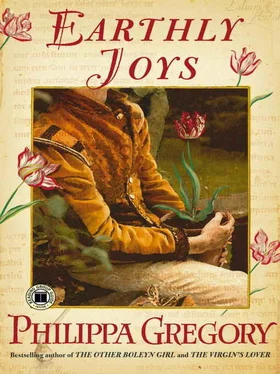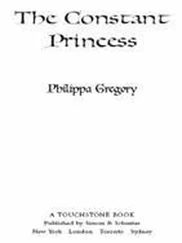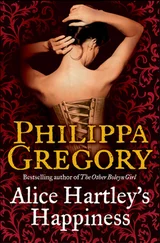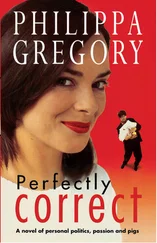John did not neglect the garden at Oatlands while J was away. He had planted a new consignment of daffodils in the autumn and that spring he was in the king’s court every day, watching the green spears break through the soil. For the queen he had planted tulips in great china bowls, and forced them to bloom early. They might be worth a fraction of their original value but John would not throw good bulbs on the midden because they had once been worth a fortune and were now sold for shillings. He had bought them for love of their color and shape and he loved them still. He put them in the orangery by the windows for the light and kept them warm. Their Majesties were due at the palace in late February and John wanted the bulbs in flower for their private apartments.
He was lucky; the royal party were delayed at Richmond and did not come to Oatlands until early March, and the tulip buds were fat and green and striped with the promise of color when they arrived.
They were accompanied by a troop of new designers and decorators. It was the queen’s desire that her apartments should be remodeled and repainted. “What colors shall I have on the walls?” she asked John. “Here is Monsieur de Critz, who will paint me cherubs or angels or saints, or whatever I will.”
John looked at the tulips on her table, which were slowly going a deep glossy red. “Scarlet,” he said.
She rounded on him, spitting with anger. “D’you think to insult me?” she demanded.
He realized at once that she was smarting from the bawdy songs they were shouting in the streets of London about the two scarlet whores – the Pope and the Queen of England, who was shamefully in his toils.
“No!” John stammered. “No! I was looking at your flowers!”
She turned and caught sight of the tulips. “Oh.” Her charm had quite deserted her. “Well, anyway. Cream and pink and blue, the ascension of Mary,” she said shortly to the painter, and left the room.
The painter raised a cautious eyebrow at John.
“I’d best have a care,” John said.
“Both she and the king are quick-tempered these days,” the man said in a quiet undertone. “The news from the country gets worse every day. It is not always easy, serving at court.”
John nodded and extended his hand. “Good to see you again, Monsieur de Critz.”
“It’s been a long time,” the man said. “I last saw you years ago, when I was commissioned by my lord Cecil.”
“I remember,” John said. “You did the portrait of my lord which was made into a mosaic for the fireplace at Hatfield.”
They heard the queen’s voice raised in temper in the inner room.
“I’m off to my garden,” John said hastily.
“Will you show me around before you go? I am halfway to being lost here.”
John nodded and led the way from the rooms. “These are the queen’s apartments; the king’s rooms match them but lie the opposite side. Down below is the king’s court. On the other side, the queen’s.”
The painter looked down from the window to where John’s intricate knot garden was green and white and yellow. The outside border was the bright green of fresh growing bay, clipped tight and neat, and inside the square, as the queen had first commissioned, was a love-knot made of bay with H M and C monograms at each corner made with the brilliant iridescent blue of violets and the bright white-gold of the new daffodils.
“If they had been a month later, it would all have had to be redug with pansies,” John said.
“Did you design it?” John de Critz asked, impressed.
“My son designed it,” John told him. “But we both worked on the planting scheme. It is harder with Their Majesties than with a lord who is at home most of the time. When they come on a visit they expect it to be perfect, but you never know when the visit will be. We have to grow everything in pots or nursery beds, and only put the plants in when we know they are coming. We can’t wait to let the plants grow fine and strong in the beds and succeed each other. Their Majesties need it perfect at each visit.”
“You are a painter yourself,” the man remarked. “What patterns and color! This is even better than Hatfield.”
“I have no sense of smell,” John explained. “My son prizes flowers for their scent, and loves working with herbs for their perfume. But, since I can smell nothing, I love bright colors and shapes.”
The two men turned from the window and John led the way down to the great hall where the king and the household would dine, and then out into the court before the hall.
“Do you sleep in the hall?” John asked.
“My niece is with me; we have rooms in the old wing,” the man replied.
“Does she always accompany you?” John asked, surprised. The aristocratic members of the court might confine themselves to platonic love or to delicate trysts, but the rest of the royal household could be a rough place for a young woman when the fanciful romantic behavior of the royal parade had passed by.
“Her father died of the plague and her mother cannot support her,” the man said. “And, to tell you the truth, she has a fine eye and can work as well as any draftsman. I often let her draw for me and block the designs out on paper, and then I transfer them to the walls.”
“I will see you both at dinner then,” John said. The spring sun-shine was warm on his face and he could hear the birds singing. “I must get out and see how they are digging in the kitchen garden.”
De Critz raised his hand and went back into the palace to start his drawings for the queen.
John joined de Critz at the dinner table at midday in the great hall. At the top table were the king and queen and the favored courtiers of the day, with hundreds of rich and elaborate dishes laid before them. The queen held out her white hands for her lady-in-waiting to pull off, one at a time, each of the priceless rings, and pour a stream of warm clean water over her fingertips and then dab them with a napkin of the finest damask.
John noted, with no sign of disapproval showing in his face, that seated on one side of the queen was her confessor, and beside the king was the French ambassador. Grace was said in a quiet mutter in Latin by the queen’s confessor and it was undoubtedly a Roman Catholic grace. There was no sign at all that this was a Protestant court in a Protestant country.
There was no sign, either, of the royal family. Their portrait was there, right enough, all five children as lovely as angels under the painter’s tactful depiction. But the real children were never at their parents’ dinner table. The queen prided herself on the passion of her maternal feelings, but tended to exercise them on her real children only occasionally, and mainly when she was being watched in public.
A young woman in her mid-twenties, dressed simply but elegantly in subdued colors, walked briskly into the hall, bowed low to the top table and dropped a slight curtsey to her uncle.
“This is my niece, Hester Pooks,” John de Critz said. “John Tradescant, the king’s gardener.”
She did not bob a curtsey to John but looked him straight in the face with a smile and held out her hand for a brief firm handshake. “I am glad to meet you,” she said. “I have been walking round and round the gardens and I think I have never seen anything more lovely.”
It was the quickest route to John’s heart. He pulled out a chair for her and helped her to a piece of bread from the platter, and meat from the serving bowl which was before them. He told her about the making and improving of the Oatlands gardens, about the new breeds of tulips just blushing into colors, about the deep digging in the kitchen garden and the enormous asparagus bed.
Читать дальше
Конец ознакомительного отрывка
Купить книгу












